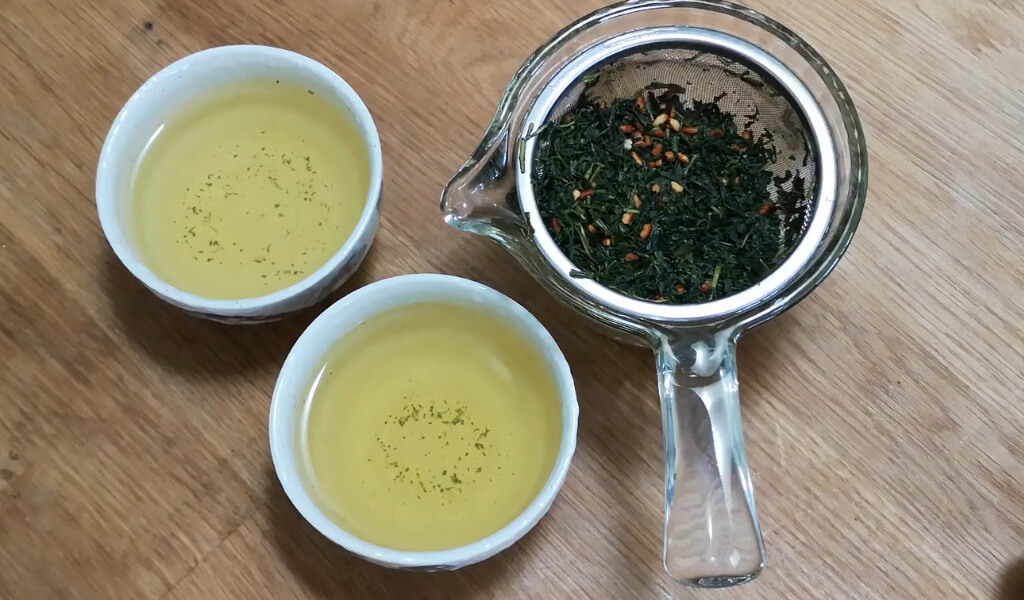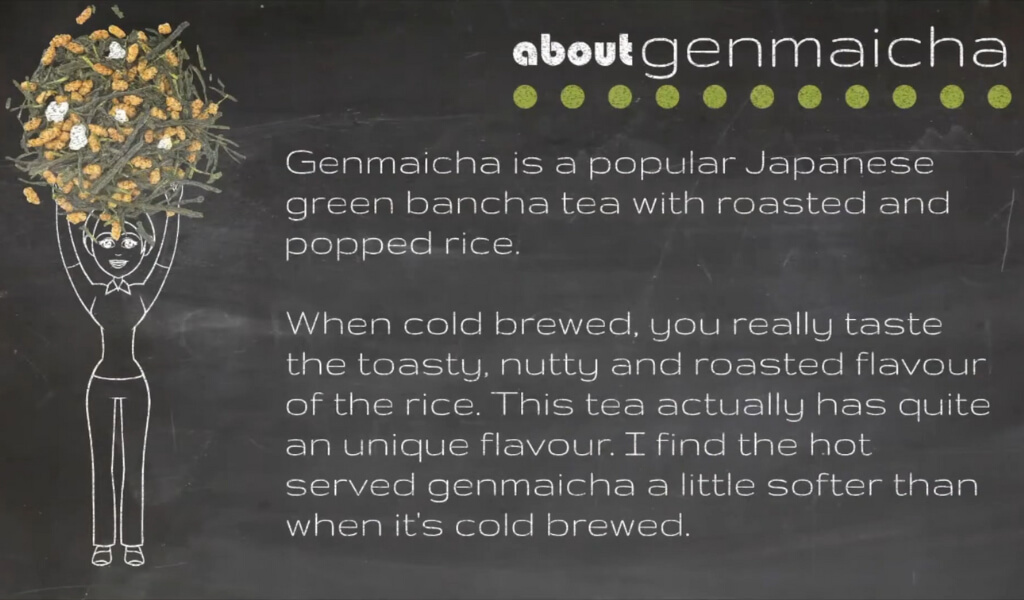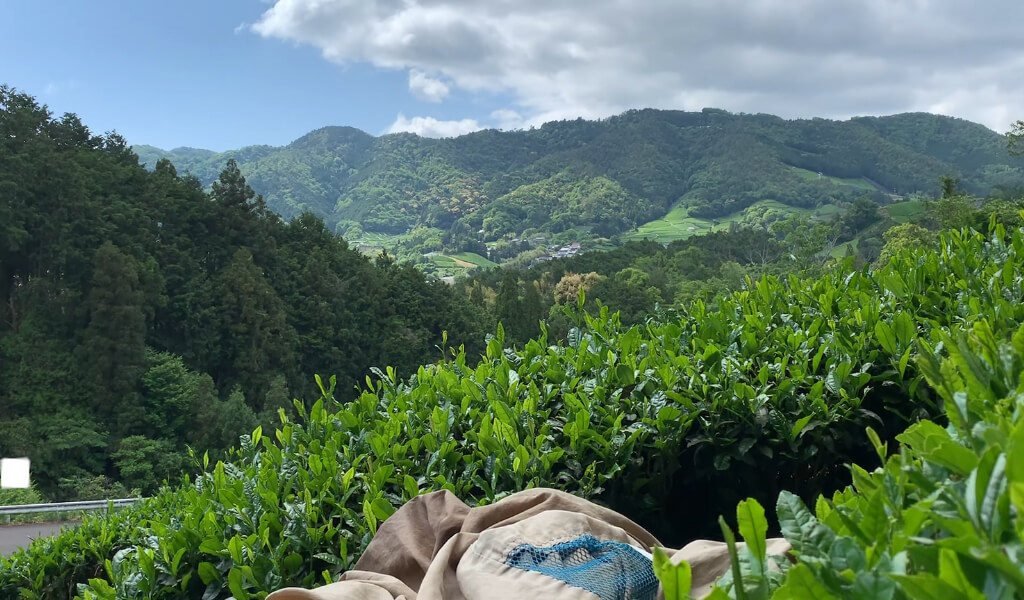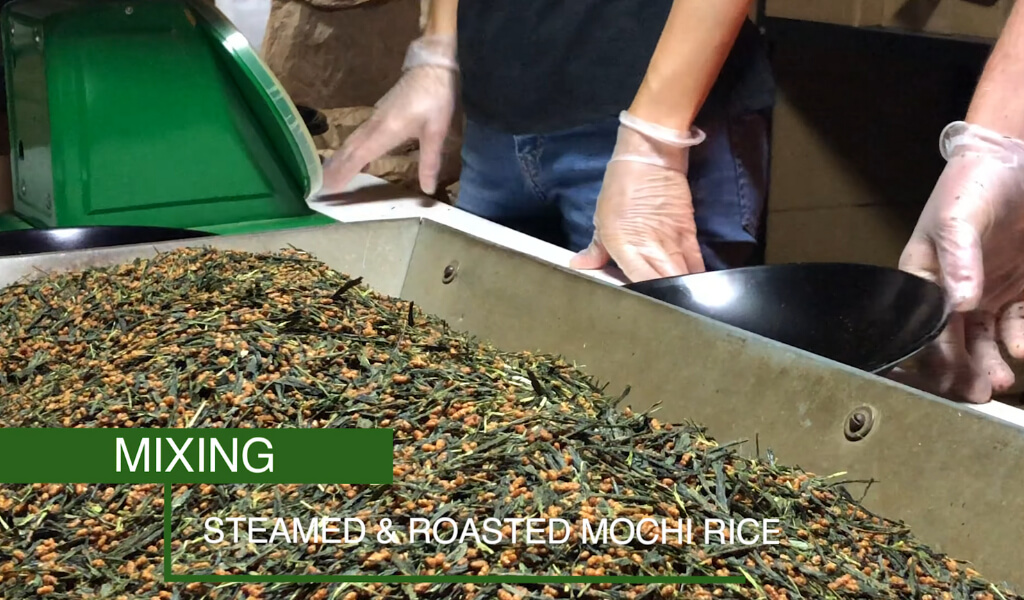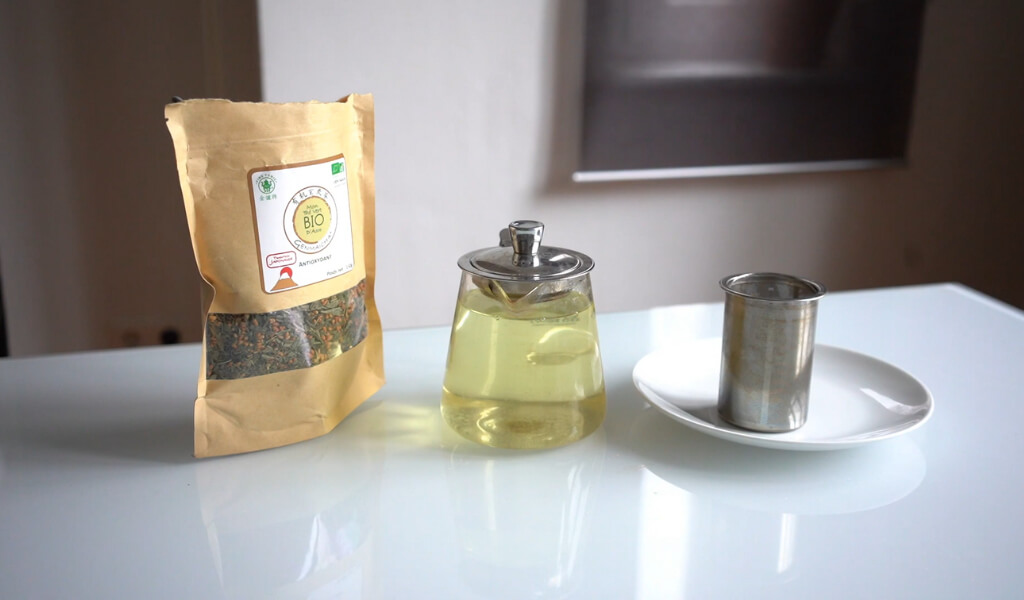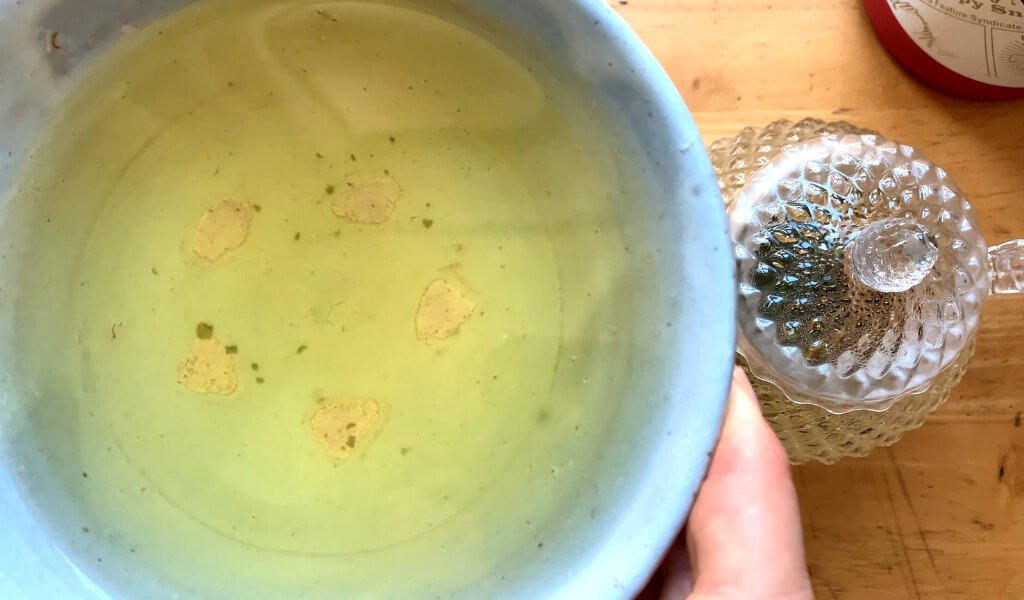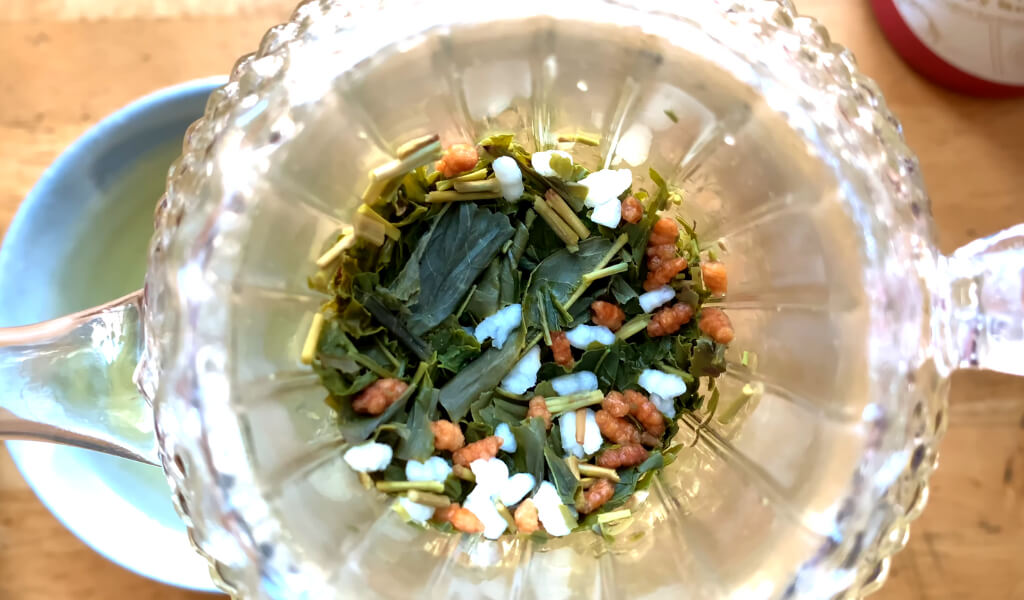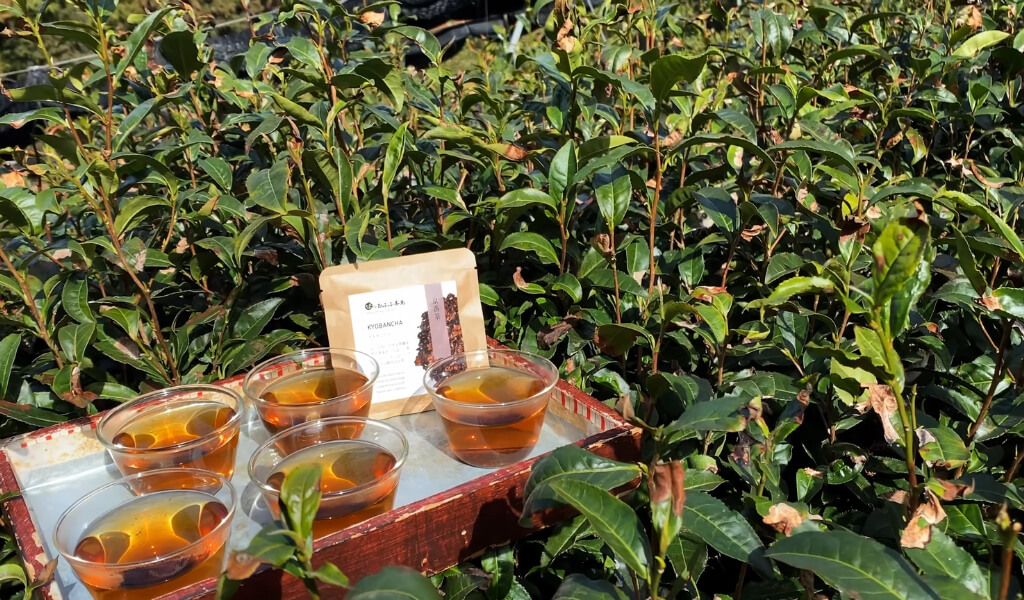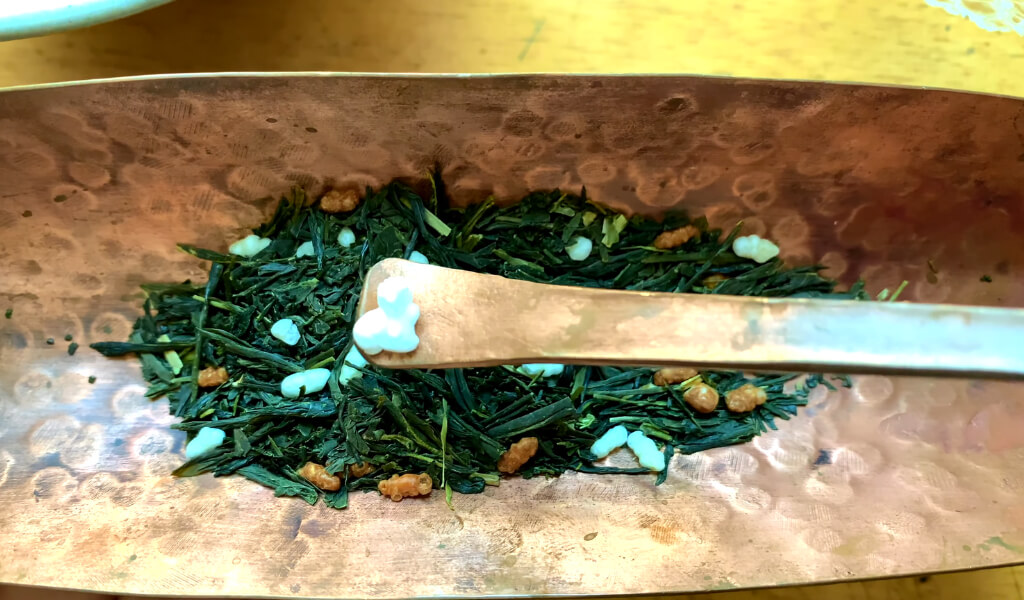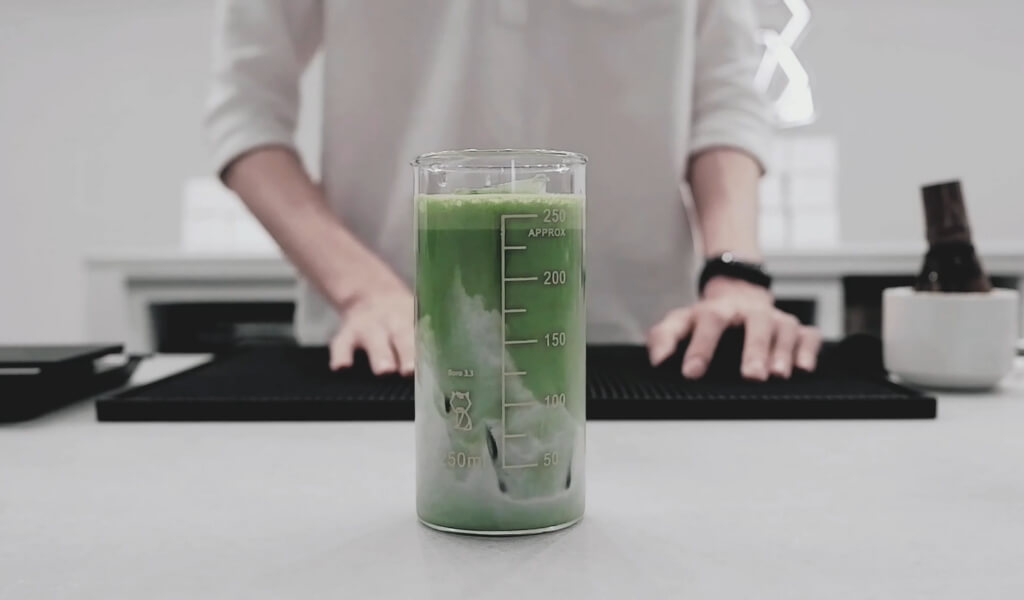As a tea enthusiast, I’ve found that Genmaicha tea is a unique and delightful blend often overlooked in the tea world.
With its distinct mixture of green tea and toasted rice, genmaicha offers a warmth and richness that’s rare to find in other teas.
In this comprehensive guide, I’ll take you through the fascinating history of this unique brew, its unique production process, and the surprising health benefits it offers.
Quotes of tea with You
“Tea is just an excuse.
i am drinking this sunset, this evening.
and you.”
– Sanober Khan, A Thousand Flamingos
What is genmaicha tea?
Genmaicha tea, commonly known as ‘popcorn tea’, is a traditional Japanese beverage combining two fascinating elements – the smooth, earthy notes of Green tea (usually sencha or bancha) and the nutty, toasted flavor of roasted brown rice. This blend creates an exquisite balance of warming and refreshing taste, making it a favorite among tea enthusiasts and newcomers.
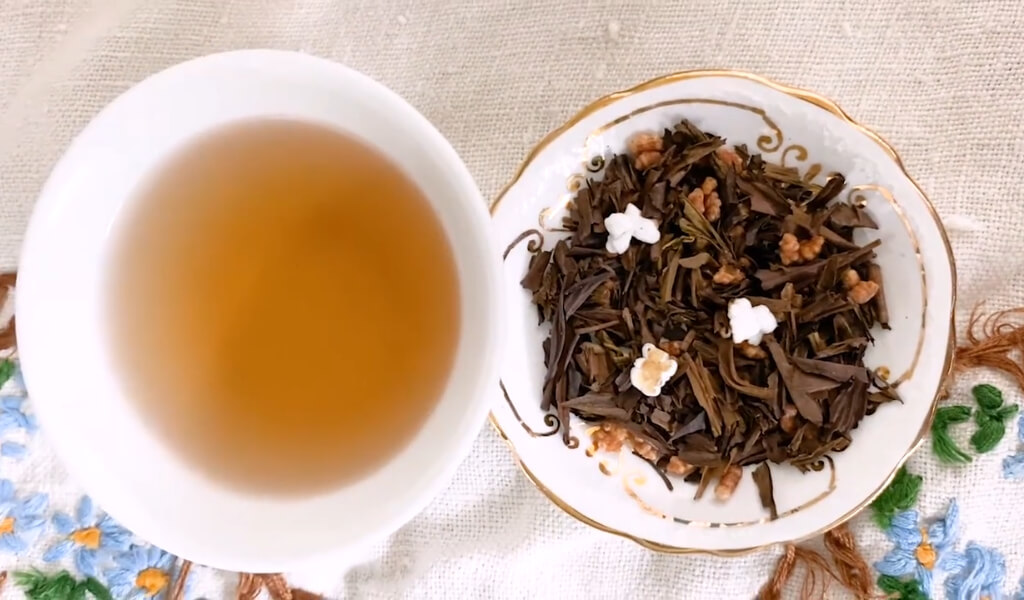
The term “genmaicha” translates to “brown roasted rice tea,” with “genmai” meaning brown rice and “cha” meaning tea in Japanese. Despite its nickname, ‘popcorn tea’, only a small portion of the rice pops during the roasting process, giving it a popcorn-like appearance. But trust me, the allure of genmaicha goes far beyond its attractive appearance!
The beauty of genmaicha lies in its unique blend, drawing from the finest of both bancha and sencha, two distinctive varieties of green tea harvested from the Camellia sinensis plant.
This plant is responsible for the many teas we love, including black, oolong, and various green teas.
The distinction between bancha and sencha lies in the timing of their harvest. Sencha, the most widely consumed green tea with roasted rice in Japan, is picked during the first or second flush, signifying the initial tea harvests of the year. Bancha, on the other hand, hails from the later, third and fourth flushes.
For tea enthusiasts, the arrangement of tea leaves on the tea plant is crucial. Sencha typically employs young upper leaves and buds, whereas bancha is made from older, lower leaves. This distinction has contributed to the perception that Bancha is a more affordably priced, less premium tea compared to its counterpart, sencha.
Bancha’s affordable price earned it the endearing title of “the people’s tea” in Japan. Its frugality and wide availability have not detracted from its charm but added to it, making it an integral component of genmaicha.

Genmaicha’s nickname, “popcorn tea”, comes from the brown rice used in its making. During the roasting process, some rice pops, resembling popcorn, and adds a delightful, toasty sweetness to the genmai tea.
This lovely fusion of bancha or sencha green tea and roasted brown rice results in genmaicha’s unique, slightly sweet, and nutty flavor. It also gives it a charming yellow hue, setting it apart from the typical green of traditional green teas. And that’s the captivating allure of genmaicha – a blend that caters to the masses without compromising taste and quality!
The Origin and History of Genmaicha Tea
Who first thought of blending sencha with roasted rice to create genmaicha?
Yamamotoyama invented “Gyokuro”! It became known as high-class sencha.
The inspiration behind it? The fine tradition of kaiseki cuisine. But don’t mistake it for the kaiseki you might enjoy at a festive gathering; this refers to “cha kaiseki,” a practice intrinsic to Japanese tea ceremonies.
In the context of a tea ceremony or chanoyu, “cha kaiseki” refers to a meal served prior to the main event, which is the consumption of matcha tea. Since the focus is on the tea itself, the kaiseki dishes that accompany it are prepared with subtle flavors and carefully designed to enhance and harmonize with the tea’s taste rather than overshadowing it.
An interesting part of this kaiseki meal involves pouring hot water over scorched rice, akin to the popular Japanese dish ochazuke. Traditionally, this simple yet comforting meal marks the conclusion of the kaiseki dining experience.
Now, let’s turn our attention to the bustling tea shops of Kyoto, where some theorize genmaicha was first brewed. Imagine the new year celebrations winding down, the festive kagami mochi (a traditional rice cake) broken apart, leaving tiny fragments too small to eat but too precious to discard. Faced with this, resourceful tea shop owners paired these rice pieces with tea in the spirit of kaiseki cuisine.
The result? An unexpectedly delightful fusion of flavors, combining the refreshment of tea and the roasted goodness of rice. It wasn’t long before this inspired concoction, organic genmaicha or ‘brown rice tea’, found its way to commercial teapots, marking a significant chapter in tea history.
Read More:
- What is Matcha Tea? Origin, Cultivation, Tastes, & Storage
- What is Gyokuro tea? Interesting facts you want to know
- What is Hojicha tea? Health benefits, taste like and Caffeine
- What is Bancha Tea? Ultimate Benefits Types & Brewing Tips
The Health Benefits of Genmaicha Tea
| Benefit | Brief Summary |
| Rich in Antioxidants |
Contains catechins and EGCG, which neutralize free radicals, supporting overall health.
|
| Weight Loss & Metabolism |
EGCG aids weight loss and metabolism, while roasted rice satisfies sweet cravings without calories.
|
| Digestive Aid |
Brown rice and green tea combination aids digestion, stimulates enzymes, and promotes gut health.
|
| Blood Sugar Regulation |
Helps regulate blood sugar levels, curbing unhealthy food cravings, beneficial for diabetes.
|
| Cancer & Heart Disease |
EGCG fights cellular damage, reducing cancer risk; lowers LDL cholesterol, promoting heart health.
|
| Dental Health |
Polyphenols with antibacterial properties combat tooth decay, cavities, and bad breath.
|
| Thyroid Function & Detoxification |
Selenium supports thyroid function; polyphenols aid liver detoxification and immune support.
|
Rich in Antioxidants
Similar to its green tea combined with brown rice counterpart, genmaicha also possesses antioxidants, specifically catechins and epigallocatechin gallate (EGCG). These substances have a significant role in promoting general well-being by counteracting detrimental free radicals within the body. Free radicals are responsible for oxidative stress, which is associated with a range of health problems, including the aging process and chronic diseases1. Therefore, the next time you indulge in a cup of Japanese genmaicha tea, keep in mind that you’re not only savoring a delightful beverage but also reinforcing your body’s protective mechanisms.
What is genmaicha tea for weight loss
If you’re journeying to manage your weight, consider Genmaicha tea. The EGCG in this tea has been linked to weight loss and improved metabolism. Moreover, the natural sweetness from roasted rice can help satisfy your sweet cravings without adding extra calories. It’s a tasty and healthy alternative to sugary beverages!
Japanese tea with roasted rice benefits for digestion
Genmaicha tea also stands out with genmaicha tea benefits for digestion. Combining green tea and roasted brown rice can aid digestion, making it an excellent after-meal beverage. Brown rice green tea stimulates digestive enzymes, which can enhance nutrient absorption. Additionally, the soluble fiber from roasted brown rice promotes a healthy gut, which is crucial for optimal digestion.
Genmaicha Tea Benefits For Blood Sugar Levels
Have you ever felt ‘hangry’ – that peculiar state of hunger and anger often brought on by varying blood sugar levels? If so, genmaicha might be just the solution for you. Much like its roasted cousin, hojicha, genmaicha tea is known to help regulate blood sugar levels. This makes it a potentially beneficial choice for people managing diabetes.
Drinking a cup of genmaicha could help curb those unwelcome unhealthy food cravings. So the next time you reach for a less-than-nutritious snack, consider brewing a warm, comforting cup of genmaicha tea. Not only will it help satisfy your appetite, but it’ll also contribute to maintaining stable blood sugar levels, supporting your overall well-being.
Reducing Risks of Cancer and Heart Disease
One of the major health benefits of genmaicha is attributed to a potent antioxidant found in all green teas – EGCG (Epigallocatechin Gallate).
Research suggests that EGCG aids in preventing cellular damage, which could be instrumental in lowering the risk of several types of cancer, including bladder, ovarian, and pancreatic cancer. This antioxidant has shown a potential to suppress the growth of cancer cells, providing a protective shield for your body.
Alongside its potential cancer-fighting properties, genmaicha could be a heart-friendly beverage too. Regular consumption of this roasted rice green tea is associated with a decrease in LDL cholesterol (the ‘bad’ cholesterol) and an increase in HDL cholesterol (the ‘good’ cholesterol). This balance in cholesterol levels can contribute to a reduced risk of heart disease.
Moreover, Japanese rice tea is rich in selenium, a nutrient promoting healthy blood flow. Improved blood circulation can help reduce the risk of blood clot formation, further supporting heart health. In a world where heart disease is a pressing health concern, enjoying a daily cup of genmaicha could be a small yet significant step towards maintaining a healthy heart.
Moreover, genmaicha tea is rich in selenium, a nutrient promoting healthy blood flow. Improved blood circulation can help reduce the risk of blood clot formation, further supporting heart health. In a world where heart disease is a pressing health concern, enjoying a daily cup of genmaicha could be a small yet significant step towards maintaining a healthy heart.
Brown rice tea benefits for Dental Health
Genmaicha tea shares a beneficial quality with gyokuro, a shade-grown green tea – both can help boost your dental health. This is largely due to the polyphenols in these green tea with toasted rice, which exhibit antibacterial properties. These antibacterial qualities can help fend off the bacteria responsible for tooth decay, cavities, and even bad breath.
So next time you’re pondering what to sip on, how about switching your regular coffee for a cup of Genmaicha tea? Not only will you relish its unique, comforting flavor, but you’ll also be taking a proactive step toward improving your overall dental health. Remember, every small change in your daily routine can contribute to better well-being in the long run.
Supporting Thyroid Function and Detoxification
Did you know your thyroid, a small gland that plays a crucial role in regulating your body’s metabolism and hormone production, benefits from the selenium in genmaicha tea? A deficiency in this essential nutrient might lead your thyroid to produce either too many or too few hormones, potentially resulting in symptoms like impaired vision, fatigue, or sleeping issues.
As if regulating your thyroid isn’t enough, genmaicha also steps up its game by offering detoxifying benefits. Green tea, including the sencha in genmaicha, is naturally packed with polyphenols. These compounds provide antioxidants, which support your liver in detoxifying your body.
So, sipping on genmaicha throughout your day isn’t just a delight for your taste buds – it’s also a way to support your immune system while continuously cleansing your body of toxins. Talk about a wholesome brew!
Genmaicha Tea Side Effects
While genmaicha tea offers many health benefits, it’s important to consider some side effects and precautions associated with its consumption. Remember, while tea can be a great addition to a healthy lifestyle, it’s always wise to consider your needs and circumstances.
Caffeine Content in Genmaicha Tea
Firstly, let’s consider the caffeine content in genmaicha tea. Like all green teas, genmaicha contains caffeine. While its caffeine levels are typically lower than those found in black tea or coffee, it’s still important to keep an eye on your intake, particularly if you’re sensitive to caffeine or trying to limit your consumption.
Potential Allergic Reactions
While rare, it’s also possible for some people to have allergic reactions to green tea. Symptoms can include hives, difficulty breathing, or swelling of the face, lips, tongue, or throat. You should seek immediate medical attention if you experience these symptoms after consuming Genmaicha.
Possible Interactions with Medications
Genmaicha tea, like many teas, contains polyphenols that could interact with certain medications, such as blood thinners or chemotherapy drugs. If you’re currently taking any prescription medications, it’s advisable to consult your healthcare provider before integrating Japanese rice green tea or any other new foods into your diet.
Does Genmaicha have caffeine?
Yes, genmaicha contains caffeine, but the levels are typically lower than other green tea types. It is primarily because genmaicha is a blend of green tea leaves containing caffeine and toasted brown rice, which does not. On average, a cup of Genmaicha might contain around 10-20 milligrams of caffeine, significantly less than a cup of coffee.
However, the presence of caffeine doesn’t mean that you should shy away from genmaicha. In moderation, caffeine can have several health benefits, including improved focus and mental alertness. Monitor your caffeine intake throughout the day, especially if you’re sensitive to its effects.
So, enjoy your Genmaicha, knowing that its caffeine content is typically lower, yet it still provides a lovely little energy boost to brighten your day.
How to Brew Genmaicha Tea at Home
Creating the perfect cup of genmaicha tea in the comfort of your own home can be a delightful and soothing experience. I’ve done it countless times, and each brew is as satisfying as the last. Let me guide you through the process.
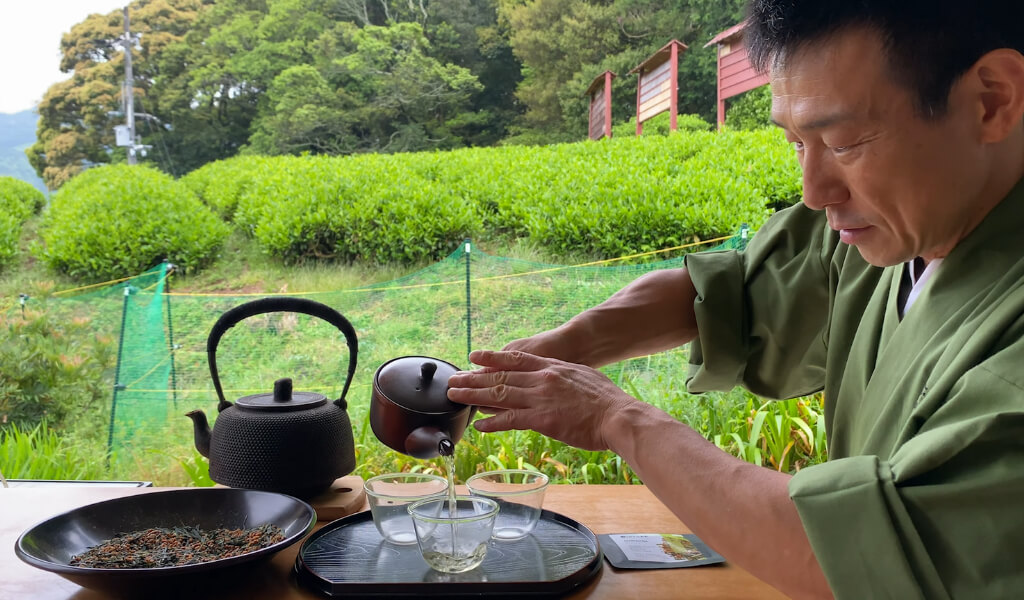
Choosing the Right Tea and Equipment
First, ensure you have the right tea and equipment. When selecting genmaicha, I recommend choosing loose leaves over tea bags, as they often provide better flavor and aroma. A ceramic or glass teapot is preferable for your brewing equipment as these materials don’t alter the tea’s natural taste.
Step-by-step Brewing Process
Once you have your genmaicha and preferred teapot, follow these steps:
- Warm up your teapot with hot water, then discard it.
- Add one tablespoon of genmaicha tea leaves for every cup of water.
- Pour hot water (80-85 degrees Celsius) over the Japanese brown rice tea.
- Let it steep for 2-3 minutes, depending on how strong you prefer your tea.
- Pour your genmaicha into a cup, leaving the leaves in the pot for a potential second brew.
Tips to Enhance Your Genmaicha Experience
To truly appreciate your genmaicha tea, I have a few tips for you:
- Savor the moment: Take a moment to appreciate the aroma of the tea before taking your first sip. It is part of the tea-drinking experience.
- Second brew: Don’t discard the tea leaves after the first brew. You can use them again for a second, lighter brew.
- Storage: Store your tea leaves in an airtight container in a cool, dark place to preserve their flavor and freshness.
So, are you ready to brew your first cup of genmaicha tea? Trust me, once you taste this unique blend, you’ll reach for it repeatedly. Happy brewing!
How Do You Store Genmaicha Green Tea?
Storing genmaicha green tea properly is crucial to preserving its unique, flavorful blend of green tea leaves and toasted rice. If you’ve ever wondered why your tea might not taste as vibrant or fresh as when you first bought it, it might have to do with your storage methods. But don’t worry! I’m here to guide you on storing Genmaicha tea in the best way possible to maintain its unique flavors and aromas.
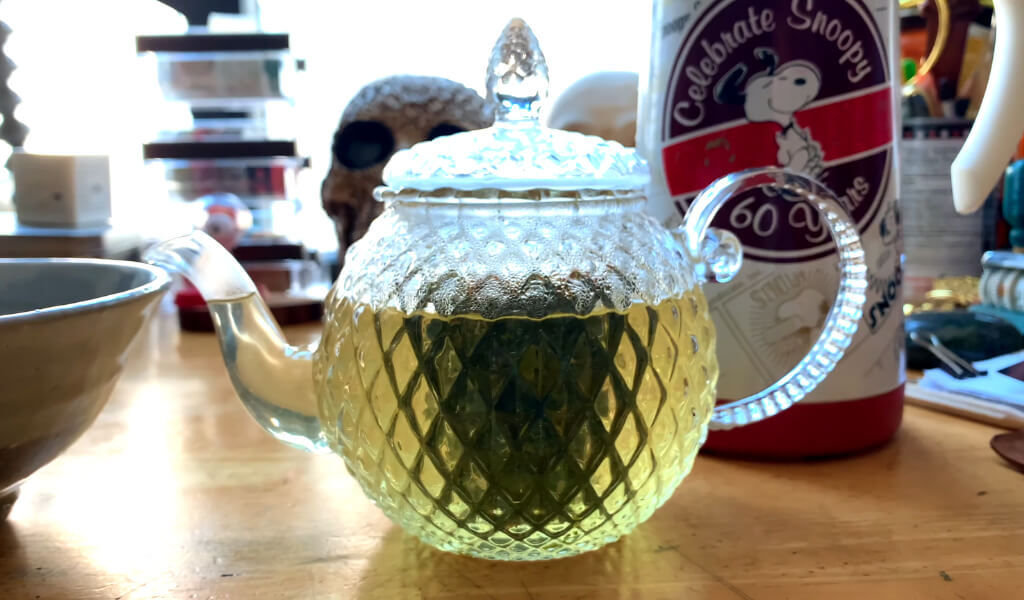
Firstly, always store your genmaicha tea in an airtight container. It will prevent it from getting exposed to air, which can lead to loss of flavor.
Secondly, keep the container in a cool, dark place like a cupboard or pantry. Sunlight and heat can degrade the tea and cause it to lose its freshness.
Finally, if you want to extend the life of your genmaicha tea, you might consider storing it in the refrigerator. But remember, it must be in an airtight container to prevent it from absorbing odors from other foods.
Additionally, when you decide to use it, let the tea come back to room temperature before opening the container. It will prevent condensation, which can negatively affect the tea.
By following these storage guidelines, you’ll be able to enjoy a delicious and vibrant cup of genmaicha green tea every time you brew. Now, isn’t that worth the extra bit of care?
Conclusion: The Unique Charm of Genmaicha Tea
In conclusion, genmaicha tea, with its unique blend of green tea and toasted brown rice, offers a distinctly pleasant and comforting taste experience. Its many potential health benefits and lower caffeine content than other green teas make it an excellent choice for enthusiasts and novices.
Whether curling up with a good book or starting your day with a peaceful moment, genmaicha tea offers a unique, nourishing experience. So why not give it a try? Discover for yourself the unique charm of this delightful Japanese tea!
Thanks For spiriteadrinks.com
Frequently Asked Questions About Genmaicha Tea
Can Pregnant Women Drink Genmaicha Tea?
Yes, pregnant women can generally enjoy genmaicha tea. However, it’s important to remember that genmaicha contains some caffeine, even less than other green teas. As caffeine intake should be monitored during pregnancy, always check with your healthcare provider to confirm how much genmaicha tea is safe to consume during this time.
Can I Drink Genmaicha Tea on an Empty Stomach?
Indeed, you can drink genmaicha tea on an empty stomach. Many people enjoy it in the morning for its subtle, comforting flavor and slight caffeine kick. However, if you are sensitive to caffeine on an empty stomach, you might prefer to have something to eat first.
Is Genmaicha Tea Suitable for Kids?
Genmaicha tea is generally suitable for older kids, as it’s milder green tea. However, it may not be ideal for very young children or those sensitive to caffeine because it contains caffeine. As always, it’s recommended to consult with a pediatrician first.
What is Genmaicha tea good for?
Genmaicha tea is lauded for its numerous health benefits. With its rich antioxidants, genmaicha helps combat cell damage, promotes weight loss, aids digestion, and even works towards regulating thyroid hormones. It’s a wholesome beverage choice for a balanced lifestyle.
What is the difference between Genmaicha vs Green tea?
The primary difference between green tea and genmaicha is that genmaicha combines traditional green tea, typically bancha or sencha, with roasted brown rice. This addition of brown rice imparts a distinct nutty flavor and a slightly sweeter taste to genmaicha, setting it apart from the purely vegetal taste of regular green tea.
Can you drink genmaicha every day?
Yes, you can enjoy genmaicha tea every day. Its lower caffeine content than other green tea with rice can be a comforting daily drink. As with all teas and caffeinated beverages, moderation is key, and individual tolerance to caffeine may vary.
is Genmaicha tea healthy for sleep?
While genmaicha does contain caffeine, the amount is significantly lower than other teas and coffee. It means green tea with roasted brown rice is less likely to disturb your sleep cycle, and some people even find drinking tea before bed a soothing and helpful part of their nighttime routine.
Does Genmaicha keep you awake?
Genmaicha has a lower caffeine content than many other types of tea or coffee. So, while it doelikelyn some caffeine, itifikely to keep you awake unless you’re particularly sensitive to caffeine. Everyone’s tolerance is different, so listening to your body is important.
How often should I drink Genmaicha?
The frequency of drinking genmaicha tea depends on your preference and tolerance for genmaicha caffeine. Some people might enjoy a cup of genmaicha tea daily, while others might opt for every other day or just a few times a week.
Can you drink too much Genmaicha?
As with any beverage, it’s possible to drink too much genmaicha, especially if you are sensitive to caffeine. Even though the genmaicha tea caffeine is lower than other teas, consuming it in large quantities can lead to potential side effects like jitteriness or upset stomach. As always, moderation is key.
I’m Shanna, creator of Spiritea Drinks. I’m all about teaching people to grow their own food, tea, cook what they harvest, and eat with the seasons.

